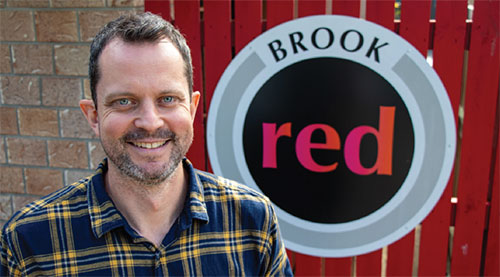Brisbane man Nick Moreau struggled with suicidal thoughts for more than a decade. An unhappy atmosphere at home was the catalyst for his downward spiral. Dark thoughts became his new normal. They would come and go without rhyme or reason. He battled these feelings alone. ‘I didn’t reach out for help for a long time,’ Nick said.
‘I didn’t feel like I could talk to my parents and I had two younger brothers I needed to look after. I felt like I had to be the strong person for my family. I tried to manage it all on my own.’ Nick’s recovery only started when he stopped trying to fight and suppress his thoughts of suicide, and reached out for help. Nick is using his experiences in—and insight into—suicidality to play an important role in how Queensland Health responds to Queensland’s suicide crisis.
Nick is one of many people working in the Queensland healthcare system with a “lived experience of suicide”. “Lived experience” describes someone who has either attempted suicide, experienced suicidal thoughts and feelings, or lost someone they know to suicide. Involving people with a lived experience in the shaping of healthcare services is an important part of the service planning and delivery process for Queensland Health.
People with a lived experience hold unique insight into how services can better respond and care for people in distress, and how best to prepare them for their journey to recovery. Nick applies his own experiences and insight in his role as a program coordinator at Brook RED, a peer-managed community mental health organisation in Brisbane. Nick and the Brook RED team have worked closely with Queensland Health to develop Living EDge. Living Edge is an alternative space at Redland Hospital for people experiencing suicidal distress. It is located near the Redland Hospital emergency department and provides a calming space where people at risk of suicide can talk to peer support workers, enjoy relaxing activities and arrange ongoing guidance and support.

Nick Moreau is using his lived experience to help others
Living EDge is funded by Queensland Health under the Suicide Prevention in Health Services Initiative. It is comanaged by Enlightened Consultants. The concept has been trialled overseas and similar programs are active throughout New South Wales. The Enlightened Consultants Director, Helen Glover, said Living EDge is a more suitable option for people who rely on hospital emergency departments in times of suicidal distress. ‘We heard from hospital staff that due to the nature and pressures of the emergency department, it is not an ideal place to support people in suicidal distress,’ she said. ‘These people want to be heard. They want a space where they can quietly sit with someone and be heard and understood, and that’s what Living EDge offers.’
All of Living EDge’s peer support workers have a lived experience of suicide, and their knowledge helped shape the design and implementation of the program. Nick said having a lived experience allows a peer support worker to offer more authentic empathy and understanding to people in distress. ‘When you’re struggling with your thoughts, being able to talk to someone who understands you and how you’re feeling is very important in the recovery process,’ he said. ‘Just knowing that we’ve been through it and that we’ve moved forward is really helpful for people struggling to see a future for themselves. It gives people a living example of hope.’ From his own experiences, Nick said that sitting down with someone and working through a checklist or mental health plan—especially in the first few sessions—is not always suitable for people in suicidal distress. ‘Instead, we focus on developing a therapeutic relationship with each person and providing an opportunity for them to talk and be heard,’ he said. ‘We know that’s the best way to make connections, and that’s when we seem to get the best results.’
The Executive Director of Queensland’s Mental Health Alcohol and Other Drugs Branch, Associate Professor John Allan, said Living EDge highlighted the Queensland Government’s commitment to suicide prevention. ‘Living EDge is a fine example of the groundbreaking techniques we are applying as part of our efforts to eliminate suicide deaths in the community,’ he said. ‘It is an innovative approach that provides specialist care for vulnerable people in our community, and relieves some of the pressure on our hardworking emergency department staff.’
The Living EDge service is available for referrals for one-on-one support between 4pm and 8pm each Monday, Tuesday and Wednesday. A group support session is available each Thursday from 4pm to 8pm.
People can self-refer to Living EDge by calling 0433 724 337.
Keep up to date with Clinical Excellence Queensland:
- subscribe to our mailing list
- follow us on Twitter or Facebook.